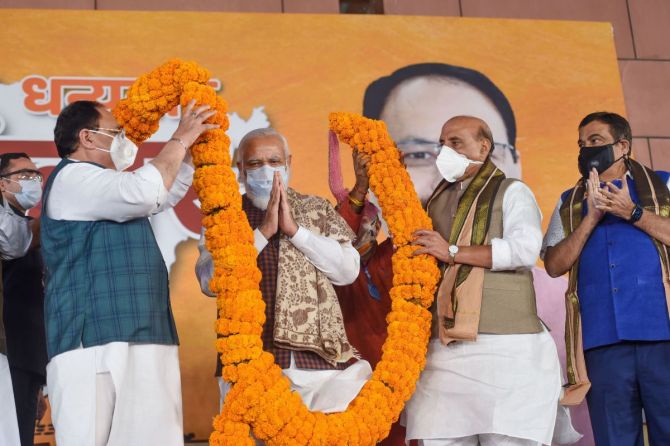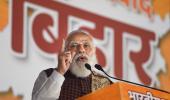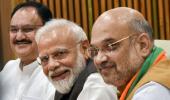Winning an election may be a breeze for the BJP but the aftermath of victory isn't always painless.
Radhika Ramaseshan reports.

2020 started on a despondent note for the Bharatiya Janata Party with the rout in the Delhi Assembly election.
As the year unrolled, the pandemic -- followed by the exodus of migrants from cities to their home states who trudged and cycled for miles on end in the summer months -- preoccupied the Centre and the party.
2020 was a smorgasbord of near-hits and complete misses for the BJP.
It just about put together a government in Bihar with its ally, the Janata Dal-United, after combating a resurgent Rashtriya Janata Dal.
The silver lining was that after years the BJP gained an upper hand over the JD-U in the coalition government.
Among the noteworthy breakthroughs, one was in Telangana.
The BJP defeated the ruling Telangana Rashtra Samithi in an assembly by-poll and nearly upstaged the TRS in the Greater Hyderabad Municipal Corporation election.
The last act of hurrah saw the BJP virtually sweep the Jammu region in the first District Development Council polls in Jammu and Kashmir, after it lost its special status.
What are the challenges in 2021?
A general secretary listed them as "wresting West Bengal, resolving the farmers' agitation, and putting in place structural changes in the organisation to ensure we are permanently geared to win every election" in that order.
These priorities corroborated a notion that for the BJP, electoral triumphs were as critical, if not more, than conducting the business of governance.
Y Satya Kumar, national secretary and a co-minder of Uttar Pradesh, said: "We are fixed on strengthening booths, shakti kendra (power centres) and mandals in every assembly constituency in the country. No relaxing until that's done. It's about putting in 18 working hours daily."
For Sunil Deodhar, national secretary minding Andhra Pradesh and parts of West Bengal, the "ultimate test" lay in "correcting the wrong narrative created by the Opposition about the Centre's policies and decisions".
"The prime minister's decisions and policies are conceptualised in the right spirit but wrongly interpreted. The challenge for our social media and grass-root workers is to project these in the right perspective and importantly, see that the benefits percolate down to the last individual," said Deodhar.
On December 25, Prime Minister Narendra Modi unwrapped the last tranche of the payment of Rs 2,000 -- earmarked for small and marginal farmers under the Pradhan Mantri Kisan Samman Nidhi or PM-KISAN in three instalments totalling Rs 6,000 -- hoping that the televised release would soften the hostility that accumulated since the passage of the agricultural reform laws.
BJP sources sounded unsure if this move would mollify the agitators who are mostly kulaks.
However, Information and Broadcasting and Environment Minister Prakash Javadekar claimed: "This is the government that has given farmers so much and met their real demands. MSP (minimum support price) will continue, so will the APMC (Agricultural Produce Market Committee)."
"The government has shown its willingness to continue talking to the farmers and the dialogue will solve their problems," Javadekar said.
In the electoral arena, BJP sources reiterated the East and the South would be the focus areas, foot firmly on the pedal.
Vinay Sahasrabuddhe, Rajya Sabha MP and president of the Indian Council for Cultural Relations, said: "The strategy is to reap harvests in the areas that are not considered fertile for us, where our investments were not big. West Bengal is one of them."
Notwithstanding the palpable groundswell of backing for the BJP in Bengal, visible in the recent visit of Amit Shah, home minister, and the high-profile defections from the Trinamool Congress, the sources said the biggest worry was about the contest becoming "bi-polar".
"That might not work to our advantage. The Congress and the Left have exited the battlefield. We need them to cut the Trinamool's votes," a source said, adding the entry of Asaduddin Owaisi's All Indian Majlis-e-Ittehadul Muslimeen raised the hope that he could take away some of the Trinamool's Muslim votes.
Winning an election may be a breeze for the BJP but the aftermath of victory isn't always painless.
"We have a problem of plenty," a source admitted, especially in those states where deserters from the Opposition had joined in droves before an election and became restive after a government was formed and they got nothing.
"A spirit of accommodation for newcomers is required. They come with aspirations and the onus of fulfilling those aspirations is on us," said Sahasrabuddhe, who as a former Madhya Pradesh prabhari shepherded the induction of Congress defectors in the BJP.
In Tripura, where BJP Chief Minister Biplab Kumar Deb's cabinet is packed with Congress and Trinamool backsliders, the absorption became so messy that recently Deb threatened to quit under pressure.
A weak Opposition doubtless helped the BJP's onward march. But triumphs also come with a price.
Feature Presentation: Aslam Hunani/Rediff.com











